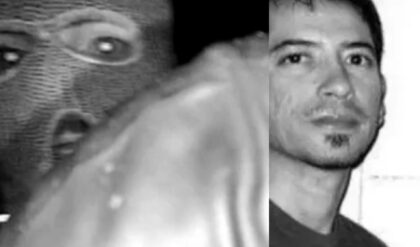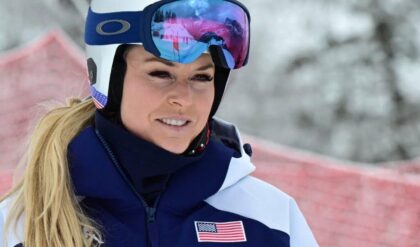
Morfydd Clark as Galadriel in The Lord of the Rings: The Rings of Power. Ross Ferguson/Prime Video
John Ronald Reuel Tolkien famously detested allegory, and any one-for-one analysis of his life and work runs the risk of making a dead man roll over in his grave. Still, it’s impossible not to see echoes of Middle-Earth in almost every sentence of his biography. Tolkien was four years old when his father died. His mother followed eight years later. In the opening moments of Fellowship of the Ring, the Gaffer and Samwise Gamgee defend friend and orphan Frodo Baggins from Hobbiton gossip. I’ll let you decide how to feel about the way that choice pairs with the fact that Tolkien survived the years between his parents’ death and the great war by eagerly making friends and sharing his fascination with language and mythology. Personally, I’m immensely moved by the way that exact kind of friendship ends up saving the world in his greatest and most popular series.
Tolkien began his lifelong project in the trenches of one of the bloodiest wars in human history. He watched thousands of boys his age die in the name of empire and industry, pastoral farmland infested for the first time by winged beasts of war and iron behemoths spraying miles of fire. By 1918, all but one of his best friends were dead. Others of his generation abandoned heroic storytelling because of that terrible experience. Their reaction is understandable, but Tolkien went the opposite direction, escaping the “hideous experience” of his youth into a more forgiving world of language, myth, and heroic camaraderie. The history of the elves began in a military hospital, and the first Lost Tales were a direct response to tragedy.
W. H. Auden felt, as I do, that Tolkien used Middle-Earth, at least subconsciously, to make his own world make sense. The world could be beautiful—he knew this from his long hours reading, the friendships he built around shared fascination. The world could be hell—he knew this from his tumultuous childhood and young adulthood. And so he rearranged the world, not in terms of pleasure and pain but mileage, a distance that could be walked from an idyllic Shire to a hellish Mordor where even the purest soul might succumb to evil, might be hurt in a way that could not heal entirely this side of paradise. He took those older storytelling forms and tried to fill them with all the beauty and pain he was capable of expressing, working toward an ending with some kind of peace.

Sophia Nomvete as Disa and Owain Arthur as Prince Durin IV. Ross Ferguson/Prime Video
The Challenges of Adaptation
I believe at least some of the creative voices behind The Rings of Power understand Tolkien’s work, perhaps even better than Peter Jackson’s trilogy, which was my whole personality between 7th and 10th grade. I did not feel this way from the start: When Amazon’s series premiered in 2022, I yawned it off, along with roughly 63 percent of its viewers, only completing the first season a few months after my obsession with rival myth saga Andor (obviously a superior show in every way) had wound down. I’ve probably raved about Andor more than anything else in the 20 years since the Lord of the Rings films, and in its shadow, Rings of Power strayed out of thought and time.
But in preparation for this article, having recently reread The Fellowship of the Ring, I returned to the first season. What I saw shocked me. For the first time, I fully understood Christopher Tolkien’s complaints about Peter Jackson’s films. Those films are inarguably better-told, better-realized products in every conceivable way—I would burn all of Rings of Power to save any random 20 minutes from that trilogy—and yet I believe Rings of Power may understand the assignment better. Jackson’s films foreground beauty and sensitivity far more than the average blockbuster, but check the screen time. They still favor the war, the spectacle, the fireworks. When the young Hobbits beg Tolkien’s Gandalf for fireworks, he grumpily tells them to wait; Jackson’s Gandalf sets the fireworks off and laughs along with the kids. It’s his ethos as a storyteller, his conviction that getting straight to the good stuff isn’t all that bad.
Rings of Power makes a different call, one that I think hews closer to Tolkien’s own storytelling ethos: that the war may be the flashiest, most exciting part, but the friendship needs to be more central, more compelling than the power struggle, because ultimately Middle-Earth is about yearning for a world where friendship may undo power once and for all. At least in its first season, Rings of Power was willing to fail in an effort to make that point. The second season, currently releasing weekly on Prime Video … well, I’ll get to that in a moment.
True, you can tell this is series creators Patrick McKay and J. D. Payne’s first-ever TV show. Take the sound choices in Poppy’s ballad as the Hobbits (sorry, Harfoots) wander across the prairie with Gandalf (sorry, the Stranger). It’s one of my favorite moments in the show, but the mix is all wrong. Jackson’s films would have accompanied the song with some sweeping music to bowl the audience over emotionally. The show focuses solely on Poppy’s voice, which is a different choice I like in theory, but there’s no texture. Initially it’s accompanied by the noise of the trail itself, but then the track cuts to a cleaner studio-recorded version. The trouble is that Tolkien’s world is all about texture. We’re meant to feel immersed in feeling, and this choice pulls us out of the world and drops us into a sound booth somewhere far away. It’s a fantastic moment undercut by a poorly conceived creative choice.

Markella Kavenagh as Nori, Megan Richards as Poppy, and Daniel Weyman as the Stranger. Ross Ferguson/Prime Video
Rings of Power is full of moments like that: well-intended decisions that don’t entirely work, where you can’t tell whether the disconnect comes from the divide between corporate and artistic priorities or the people involved just made a bad call. But the series is also full of big and quiet feelings, virtues of Tolkien’s work I never thought I’d see adapted to the screen. If you’re plugged into the emotional architecture, these quiet glances, displays of earnest affection for its own sake—moments critics (including me, mind) have called “boring”—become the soul of the series. The honesty in the friendship between Elrond and Durin. The world-worn pragmatism of Harfoot elders in moments of crisis. Arondir declaring his love for Bronwyn “a hundred times over, in every way but words.” As two characters believe they’re going to die, the older one takes her final moments to whisper, “Close your eyes. It’ll only hurt a moment.” It’s heartbreaking, well observed, and something I think many shows wouldn’t include because they wouldn’t care about that specific character’s perspective in the midst of the surrounding action.
Take the series’ opening sequence, featuring young Galadriel in Valinor lamenting the destruction of a paper boat. She’s so innocent that she feels affection for inanimate objects, and suddenly she’s thrust into a terrible war that kills her real loved ones. Elrond recalls his father’s sacrifice in the distant past, a loss he survives by eagerly making friends with everyone he meets. In both cases, the show translates Tolkien’s life indirectly into myth. Sure, it’s not as boundary-pushing or attention grabbing as, say, Game of Thrones, but do you really need to see eyes gouged out and relatives bumping uglies in everything? Can’t we tolerate a little sincerity and innocence now and again? I think there’s still some room for it. I actually think our souls require it, even or especially as our estimations of the world grow more cautious, perhaps cynical, with time.
That said, to the joy of some and frustration of others, or at least me, the quiet character moments from season 1 have been curtailed in the Rings of Power’s greatly inferior second run.
Note: The rest of this article contains spoilers for season 2.

Lloyd Owen as Elendil and Cynthia Addai-Robinson as Queen Regent Míriel. Ross Ferguson/Prime Video
A Focus on Action
In season 2, every scene has a clearly stated objective, always returning to a well-defined battle between Good Guys and Bad Guys, looking for the map to lead to the staff to lead to the fortress to solve the riddle. We have more random monster battles, more fanservice, more references to other books and movies, more love triangles. It’s much easier than the first season to follow while half paying attention and, in my opinion, much, much less interesting. Even Tom Bombadil, among the greatest time wasters in literary history, basically hands the Stranger his mission, should he choose to accept it.
It’s closer to the balance Peter Jackson’s movies struck, but far less successful. I love the Jackson films immensely, but I love them as action cinema at least as much as adaptations of the source material. Those truly Tolkien moments (Frodo hugging Gandalf with such gleeful abandon, Aragorn kissing Boromir’s head, Sam and Frodo cradling each other on the edge of Mount Doom) hit so hard because you usually wouldn’t expect them inside a typical action movie framework. It dominated a stereotypically masculine genre with sincere depictions of male sensitivity, and it also sometimes blew your mind with the beauty of architecture and nature.
Jackson cut Tolkien’s least accessible impulses in an effort to highlight what he regarded as the really important stuff for a Star Wars–sized audience. Apologies to Tom Bombadil, but I’m not sure I would have emerged from that theater in 2001 with an eternal dream in my heart if I’d spent 30 minutes with him before arriving in Rivendell. The same goes for the Scouring of the Shire: Thematically, it’s quite moving, perhaps even essential. But I’m glad Jackson’s Return of the King didn’t end with an hourlong detour involving Saruman and Hobbit politics.

Robert Strange as Glûg. Ross Ferguson/Prime Video
Christopher Tolkien wasn’t entirely wrong—they did transform his father’s books into action movies for teenagers. But I don’t think he ever understood how much of his father’s legacy remained at the forefront of the cultural consciousness because Jackson made such a successful translation of his most essential ideas. (Side note: this is also why I greatly prefer the theatrical cuts to the extended editions. They’re better, more sharply edited films, not deeply compromised lore repositories)
Part of adaptation is knowing what to cut, and I admit I’d hoped Rings of Power would find a path besides Jackson’s. Again, I love the movies, but we already have them. This most recent rewatch of the show gave me hope that it might work more of not just Tolkien’s fascinations but his ethos and temperament as an artist into the show. They tried so hard in season 1, and found real success! But of course, there’s a cost to be paid. I recently read an article that celebrated the show’s diminishing ratings and advocated for the current showrunners being fired and a new series made that would be “not boring” and “true to lore.” I suppose these could be sincere complaints, but frankly, complaining that a Tolkien property is boring and then asking for that same property to hew closer to Tolkien’s original vision feels a bit like saying, “The NFL really needs to do more to stop concussions. And why won’t they let the players hit anymore?!”
Tolkien’s Lasting Power
I suspect anyone who has read through any chunk of Tolkien’s work has hit spots that tested their patience. I know I have. But at the same time, I think that’s part of his appeal as an artist—for everything you just can’t connect with, something comes alive for you that you may have never considered you might like. For me it was architecture. Tolkien’s dense descriptions of buildings haunted my dreams as a kid, in the best way, even while I skimmed or outright skipped the poetry. This density gives the story dimension, makes it feel whole and meaningful in ways that standard, purely utilitarian genre fiction will never approach. It reminds me of the whole source of the appendices that give Rings of Power the bulk of its characters and story: Fans of architecture, poetry, and literature sent letters to Tolkien demanding more backstory for all of their favorite elements. So he wrote one of the most famous afterwords in literary history, fleshing it all out, affirming and encouraging their enthusiasm.

Ismael Cruz Córdova as Arondir. Ross Ferguson/Prime Video
I think this omnivorous fasciation is both the source of The Lord of the Rings’ enduring appeal and a reason why adapting it has been so difficult. It’s more popular than it ought to be. It’s far too specific and whimsical to work as a four-quadrant hit, even while its preexisting status continues to make it the Most Important Thing to generation after generation of young creatives. I don’t trust Amazon, or any streaming service, to understand this, given how willing they are to cancel shows at the slightest drop in audience. And I’m wary about the second season’s apparent efforts to incorporate fan complaints by making the property less gentle, less specific, less character-centric, and more action-heavy. For Jackson, it was a creative decision—you can see all that violence and chaos throughout his whole filmography. For Rings of Power, it feels more like a cynical concession.
It’s a miracle anything of value ever gets made with a billion dollars on the line and real-life Saruman Jeff Bezos serving as a key behind-the-scenes figure. I remain convinced that McKay and Payne had by far the best pitch for a Middle-Earth drama series; their vision of the world’s Second Age is full of big ideas that draw from and occasionally brilliantly add to Tolkien’s original creation. But TV shows are about more than ideas, and while the first season had some creative flubs, the second feels like a major step down the wrong path. They have not completely lost me, but they still could. The more they try to make it like Game of Thrones and other more traditional sword-and-sorcery fantasy—the more they whittle it down to those elements they believe are best suited to mass appeal—the less interested I will become.
But for the moment, I remain glad Rings of Power exists, and I’m incredibly curious how the showrunners will tackle the next challenge involved in bringing Tolkien to the screen. I hope it continues to look like nothing I’ve seen before. I hope it goes back to being a little boring.

Rory Kinnear, left, as Tom Bombadil. Ross Ferguson/Prime Video



